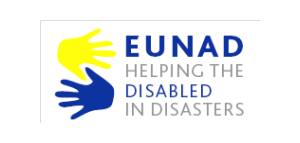What is EUNAD?
EUNAD: European Network for Psychosocial Crisis Management is an EU project aimed at developing and implementing standardised guidelines for first aid and crisis management for disabled citizens who have been affected by disaster or terrorism.
There are no standardised European guidelines for first aid and crisis management for deaf, blind or other types of disabled people after a disaster or terrorism. This is why the Danish Center for Psychotraumatology is collaborating with colleagues from Norway, Germany, Czech Republic and Austria to develop and implement these.
We refer all interested parties to the official EUNAD website, where all information about the various projects can be found.

Areas of employment:
EUNAD works with several types of disabled people, including deaf, blind, physically disabled and mentally disabled people. EUNAD will formulate the recommendations through:
- Networking with disabled people and professionals in the field
- Interviews with people with disabilities
- Expert meetings
- Local and international workshops
- Creation of national working groups
- Training programmes for professionals
Previous projects:
The first EUNAD project took place in 2013-2014. The Danish participants included deaf people; sign language interpreters; doctors and nurses from the deaf team in psychiatry; researchers specialising in psychotraumatology, first aid and crisis treatment; crisis psychologists, psychotherapists, rescue workers and the Danish National Police. It was mapped out what experience the different professional groups had with first aid and crisis treatment for deaf people in disasters, accidents or crises. Furthermore, new and exciting considerations emerged regarding future recommendations for professionals working with this target group. These are expected to be integrated into the final guidelines that will be implemented at EU level.
In addition, the Danish Center for Psychotraumatology has recently completed a research project on the problems people with reduced mobility experience when involved in an accident or injury. We investigated the experiences of wheelchair users in coping with difficult and threatening situations and their thoughts on current support options.
Furthermore, relevant information was presented to professional staff so that they can provide the best help in the event of major accidents.
Results:
Based on interviews, research literature, experiences and knowledge from other countries, the working group came up with a number of recommendations, which can be found at the bottom of this page.
Other relevant literature:
Jeppesen, T., Skøt, L. & Elklit, A. (2015). Hjælp til døve og svært hørehæmmede i krisesituationer – nye retningslinjer. Redderen, 38 (1)
Gerwinn, F., Benz, P., Richter, L., Söhn, J., Bering, R. & Elklit, A. (2018). Hearing impairments. In European Network for Psychosocial Crisis Management - Assisting Disabled in Case of Disaster
Todorovac, A., Simonsen, L. D. & Elklit, A. (2018). Review of research. InEuropean Network for Psychosocial Crisis Management - Assisting Disabled in Case of Disaster
Elklit, A., Simonsen, L. D. & Todorovac, A. (2018). No one left behind - The accessibility of medical and psychosocial services following disasters and other traumatic events: Experiences of physical disabled individuals in Denmark.InEuropean Network for Psychosocial Crisis Management - Assisting Disabled in Case of Disaster.
Skøt, L., Jeppesen, T., Mellentin, A.I. & Elklit, A. (2016) Accesibility of medical and psychosocial services following disasters and other traumatic events: Experiences of Deaf and hard-of-hearing individuals in Denmark. Disability and Rehabilitation. DOI: 10.1080/096638288.2016.1236154